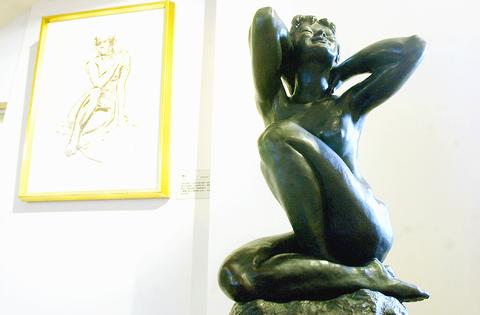Yuyu Yang (
Yang was born in Taiwan and received his education in Japan and Beijing. In Japan, Yang studied under Asakura Fumio (

PHOTO: CHEN CHENG-CHANG, TAIPEI TIMES
In The Dance of Fire (1954), Yang models the figure after the Chinese mythological character of Nu Wa Bu Tian (
Yang's work took him around the world, including to Rome, where he worked and exhibited for three years until 1966. On view in the current show are prints based on sketches he made of the streets of Rome, with that city's picturesque cafes, markets and churches.
Yang's styles changed radically during the different stages of his career. In the 1970s he turned to more streamlined, abstract compositions, two examples of which include Flight (1971) at Singapore's Mandarin Hotel and Wall Street's stainless-steel piece East West Gate (1973). This exhibition, however, emphasizes Yang's earlier, traditional works that laid the foundations for his prolific and ground-breaking career.
Art Notes
What: Naked Women and Streets of Rome: Sculptures and Prints from 1950's and 1960's (楊英風人體雕塑版畫展)
Where: Yuyu Yagn Museum (楊英風美術館), 31 Chungking S. Rd., Sec. 2, Taipei (台北市重慶南路二段31號)
When: Until Aug. 26 (Closed Monday)

Towering high above Taiwan’s capital city at 508 meters, Taipei 101 dominates the skyline. The earthquake-proof skyscraper of steel and glass has captured the imagination of professional rock climber Alex Honnold for more than a decade. Tomorrow morning, he will climb it in his signature free solo style — without ropes or protective equipment. And Netflix will broadcast it — live. The event’s announcement has drawn both excitement and trepidation, as well as some concerns over the ethical implications of attempting such a high-risk endeavor on live broadcast. Many have questioned Honnold’s desire to continues his free-solo climbs now that he’s a

As Taiwan’s second most populous city, Taichung looms large in the electoral map. Taiwanese political commentators describe it — along with neighboring Changhua County — as Taiwan’s “swing states” (搖擺州), which is a curious direct borrowing from American election terminology. In the early post-Martial Law era, Taichung was referred to as a “desert of democracy” because while the Democratic Progressive Party (DPP) was winning elections in the north and south, Taichung remained staunchly loyal to the Chinese Nationalist Party (KMT). That changed over time, but in both Changhua and Taichung, the DPP still suffers from a “one-term curse,” with the

Jan. 26 to Feb. 1 Nearly 90 years after it was last recorded, the Basay language was taught in a classroom for the first time in September last year. Over the following three months, students learned its sounds along with the customs and folktales of the Ketagalan people, who once spoke it across northern Taiwan. Although each Ketagalan settlement had its own language, Basay functioned as a common trade language. By the late 19th century, it had largely fallen out of daily use as speakers shifted to Hoklo (commonly known as Taiwanese), surviving only in fragments remembered by the elderly. In

Lines between cop and criminal get murky in Joe Carnahan’s The Rip, a crime thriller set across one foggy Miami night, starring Matt Damon and Ben Affleck. Damon and Affleck, of course, are so closely associated with Boston — most recently they produced the 2024 heist movie The Instigators there — that a detour to South Florida puts them, a little awkwardly, in an entirely different movie landscape. This is Miami Vice territory or Elmore Leonard Land, not Southie or The Town. In The Rip, they play Miami narcotics officers who come upon a cartel stash house that Lt. Dane Dumars (Damon)